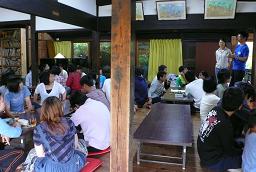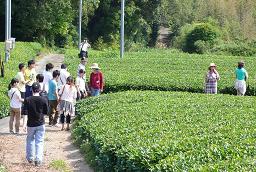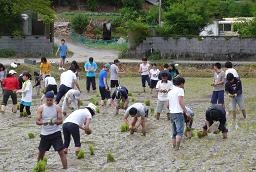News
Fujieda Field Trip: Challenge of the organic, pesticide-free, small-scale farmers for the sustainable environment and livelihood
 |
 |
 |
Download reports by FOLENS students>> ![]() Bessy Kho Sze Ee,
Bessy Kho Sze Ee, ![]() Ei Ei Theint,
Ei Ei Theint, ![]() Govinda Narayan Timilsina,
Govinda Narayan Timilsina, ![]() Tungsomkid Jameekorn,
Tungsomkid Jameekorn, ![]() Pham Ahn Thi Quynh,
Pham Ahn Thi Quynh, ![]() Roeurn Siranet,
Roeurn Siranet, ![]() Pheng Sokline
Pheng Sokline
========================================
Seven FOLENS students have participated in a two-day field study organized by Department of International Environmental and Agricultural Science of TUAT (12-13 June 2010). The field was located in the central part of the Shizuoka prefecture, showing typical landform scenery of a Japanese mountain village; streams form narrow flood plains in the hilly-mountainous landscape. The field study involved several programs: learning and experiencing organic, pesticide-free farming (tea, rice, and chicken); tasting organic, pesticide-free foods; and discussing agriculture and environment with local farmers as well as environmentally-concerned people from urban areas.
A farm family in the area, who has run a pioneer, successful organic, pesticide-free tea farm, told in their tea field the importance of developing good soils for organic, pesticide-free farming. Micro-organisms decompose organic materials to absorbable forms of nutrients. Outbreak of pests is uncommon probably due to ecological controls in their organic, pesticide-free tea farm. They also emphasized the reality of agricultural markets which are significantly influenced by large agro-companies. It is related to a consumer custom of recent years – more and more people buy and drink tea in PET bottles. The family explained misconception about organic, pesticide-free farming; it is not necessarily more costly than the ordinary farming, and the organic, pesticide-free farmers have not provided the products with unreasonable prices (middlemen and retail markets tend to make high prices). Because some of the international participants were interested in production costs of organic, pesticide-free farming, the field information provided by the family seemed to be recognized with a surprise. The group-talk in the final session brought a good opportunity for students to digest the experience. Diversity of the group members – local farmers, environmentally-concerned people from urban areas (beginners to masters), Japanese students, and international students – clearly helped the discussion.
The field study seems to have suggested three key concepts for economically and environmentally sustainable Japanese agriculture: small-scale, consumer power (mind), and farm visit. These key concepts may be recalled with the tastes of BBQ of wild boar and organic vegetables… and, of course, the elegant aroma of organic tea. (21 June 2010; TF)